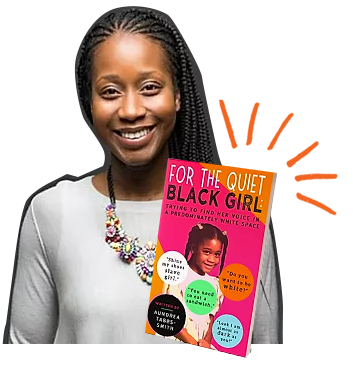Être Interview with Author Aundrea Tabbs-Smith
Ê: You say you were a "self-proclaimed quiet black girl" from the time you were young. When did you start to think that you were losing your "voice" and not being heard? How did you decide to fix that for yourself?
ATS: I began to realize that I was losing my “voice” when I was in middle school. In my book I share an experience I had with a classmate who called me a slave girl and told me to shine his shoes. I was the only black student in my class and because of this I found it extremely difficult to stand up for myself. I felt alone and powerless. I could not find the words to express my anger and frustration, so I just kept quiet. While I was at the school I was consistently made to feel less than. Whether it was because of the color of my skin or my religion, I sunk deeper inside of myself and was just trying to survive and not make any waves. I eventually left that school and even though more students of color surrounded me in my new environment, I allowed myself to be persuaded to make choices that were not in my best interest. My quiet behavior turned passive. It did not occur to me that I had a choice or voice that should be heard.
I did not start to truly change this behavior until I went to college. It was a combination of the environment and the friends that I made. I did not allow other people to speak for me. Don’t get me wrong I was still quiet, but I was no longer passive. I did not just let things happen and settle with the outcome. I watched some of the people around me make choices without thinking about how it would affect them and I did not want to do that anymore. I would think about events that occurred in my life and wish that I had said this or that, or wish that I had done things differently. I knew I did not want to have those types of regrets anymore.
Ê: Was there a relative, teacher or other mentor who helped you assert yourself as a woman of color? Do you feel, as a teacher, that you are mentoring your students to assert themselves in a similar way?
ATS: My mom is a wonderful example of what it means to be strong and assertive. She has a calm, nurturing presence but does not allow people to speak down to her. She was always this way, but when I was younger I kept a lot of what I was feeling to myself. I was ashamed and because no one else around me was experiencing something similar (or so I thought) I did not feel she or anyone could relate. I know now that was not the case and I wish I had talked to my mom more.
Teaching my students to assert themselves is extremely important to me. I share with them some of the situations I have encountered when I was their age so they can see that I am not just their teacher, but a human being who makes mistakes and is figuring life out just like they are. I want them develop a love for themselves, so that no one can shake them, so I believe in empowering my students, recognizing their strengths, and pushing them to their fullest potential.
Ê: In what period of history (other than right now) do you think this book would have had the greatest impact for women and girls?
ATS: I think my book would have had an impact during the Civil rights Movement. I think it would have given women and girls a perspective that they were not used to openly hearing about. I think that it may have provided a voice to the voiceless or at least helped to push people out of their passive behavior.
Ê: Do you think that the lessons in this book are applicable to other groups who might feel marginalized in today's society? If so, what groups in particular?
ATS: I think my book speaks to anyone who feels like they don’t belong. It speaks to anyone who has experienced something traumatic that has shifted how he or she feels about himself or herself.
Ê: Kids today - like those from Stoneman Douglas High School in Florida - are "speaking their truth" more than ever. What advice do you have for girls who really want to speak truth to power but get underestimated because of their age?
ATS: Do not let anyone dictate who you are and what decisions you should make. Take a look at yourself in the mirror and decide what you want to be or at least what you hope to be. Ask yourself what characteristics you possess or hope to acquire that will help you to be the best person you can possibly be. Do not let this world define you.
Aundrea Tabbs-Smith is the Lead Fourth Grade teacher at Rye Country Day School in Rye, New York, and is the acclaimed author of For The Quiet Black Girl: Trying To Find Her Voice In A Predominately White Space


